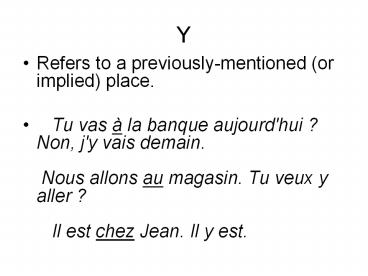Y PowerPoint PPT Presentation
1 / 13
Title: Y
1
Y
- Refers to a previously-mentioned (or implied)
place. - Tu vas à la banque aujourd'hui ? Non, j'y vais
demain. Nous allons au magasin. Tu veux y
aller ? Il est chez Jean. Il y
est.
2
- Note that "there" can often be omitted in
English, but y can never be omitted in French. Je
vais (I'm going) is not a complete sentence in
French if you don't follow the verb with a
place, you have to say J'y vais.
3
Y can also replace à a noun that is not a
person, such as with verbs that need à. Je
réponds à une lettre, je réponds au téléphone. ?
J'y réponds.Wrong Je réponds, Je la
réponds. Il pense à notre voyage. ? Il y
pense. Wrong Il pense, Il le pense.
4
IL Y A
- Il y a means there is and is impersonal and
invariable (except in tense). - Il y a trop de devoirs dans cette classe!
- Il va y avoir de la pluie.
- Y a-t-il un bon restaurant dans ce quartier?
5
EN
- En replaces the partitive article (du, de la,
des) noun or de indefinite article noun. It
is equivalent to "some," "any," or "one" in
English. As-tu du pain ? Oui, j'en ai. - Il a trouvé de largent. ? il en a trouvé.
6
- En is also used to replace expressions of
quantity, and means of it, etc. Note that "of
it" and "of them" are usually optional in
English, but en is required in French.
7
- Il y a beaucoup de chambres. Il y en a
beaucoup. - Jai trop de devoirs. Jen ai trop.
- Nous navons pas assez de biere. Nous nen avons
pas assez.
8
- En also replaces de noun with verbs and
expressions that need de. Again, in French, you
must include either de something or its
replacement en, even though "about/of it" is
usually optional in English.
9
- Il parle de ses devoirs. Il en parle.
- Elle fait du sport. Elle en fait.
10
Position of Y and EN.
- When used together, Y precedes EN.
- Il y a 4 restaurants ? il Y EN a quatre.
11
- Y and EN go before the main verb in present.
- Nous allons au cinéma. Nous y allons.
- Nous nallons pas au cinéman. Nous ny allons
pas. - Veux-tu de la pizza? En veux-tu?
12
- Y and EN go right before the infinitive in the
futur proche. - Je vais aller en France ? je vais y aller.
- Nous allons manger des escargots ? nous allons en
manger.
13
- Y and EN go before the auxiliary in the past
tense. - Nous sommes allés en France. Nous y sommes allés.
- Elle na pas pensé à ses problèmes. Elle ny a
pas pensé.

